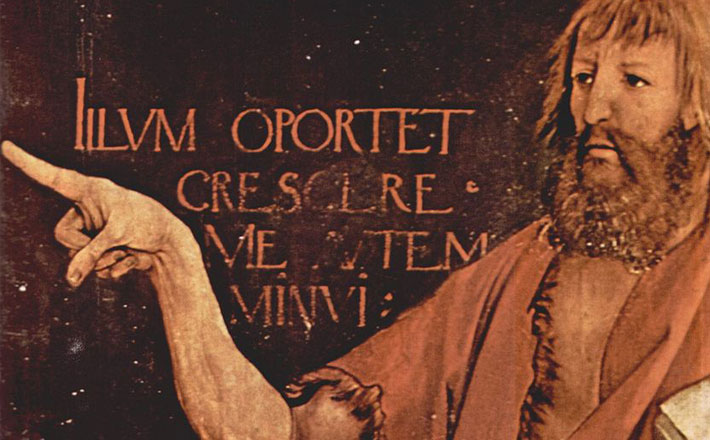Commentary on Isaiah 61:1-4, 8-11
As has been the case for the past two weeks, the Old Testament reading for this Sunday comes from the latter chapters of the book of Isaiah.
Starkly different from chapters 1-39, which are filled with words of judgment and warning, chapters 40-66 are filled with words of promise and hope. The exiles banished to Babylon may return home to Jerusalem, and the rebuilding of the city may begin.
There are three main characters in this passage: The LORD, the prophet (“me”), and the people of Judah (“they). Meaning in this passage is wrapped up in the relationships among these three characters.
The LORD
The pericope opens by describing the spirit, or breath, of the LORD. One recalls the first chapter of Genesis in which the spirit, or breath, of God hovered over the waters at creation. These verses in the book of Isaiah are nothing less than a creation narrative. Out of the chaos of destruction and exile, the LORD will create something new.
Verse 8 further describes the character of the LORD. This one who will bring forth a new creation is also one who loves justice, who hates wrongdoing. This one will give recompense, that is, give compensation or promise something different, something better, than has been before: an eternal covenant.
Finally, verses 10-11 follow a typical form for a hymn of praise in which works of God are enumerated and then praised. The operative metaphor here is that of clothing, here representing an outward sign of inner emotion or outlook. The exchange of ashes and a mantle of faintness, outward signs of mourning, for a garland and a mantle of praise, signifies a change within Zion. Here, as in Psalm 132:16, the LORD provides the clothing. The garments provided are not those of war or suffering but of salvation and righteousness, joyous as on a wedding day. Their joy, a divine gift, shall show outwardly.
The servant-prophet
The pericope opens with the news that the spirit of the Lord GOD is upon “me.” This begs the question of just who “me” is. Chapter 61 has often been associated with Isaiah 49:1-11, one of the so-called “Servant Songs” in the book of Isaiah where the LORD answers the servant, that is Israel, in a time of favor (49:8; 61:2) and proclaims release to prisoners (49:9; 61:1). What the LORD did with and through the servant Israel in chapter 49, another servant-prophet is commissioned to carry out in chapter 61.
The tasks entrusted to the servant-prophet may be understood as commissions rather than commands. There is no imperative that the servant-prophet go out to do any of these things. Rather the Lord GOD anoints the servant-prophet. In the Old Testament it is overwhelmingly priests and kings who are anointed. The servant-prophet does need seem to be either (though in the intervening verses dropped by the lectionary, the people of Judah are called priests of the LORD, vs. 6) but is set aside for a particular role. He is empowered to speak and act in ways that bring hope, joy, freedom, and comfort to the people of Judah.
The actions of the LORD and the servant-prophet are bound up together. In the opening verses of the passage it is the Lord GOD who anoints the prophet with divine spirit so that the tasks are carried out. Likewise, in verse 11, the prophet rejoices in being clothed with divine garments of salvation and robe of righteousness.
The people of Judah
The final persona in the passage is the people of Judah, in particular those who have returned from exile. They too have a task. As with the prophet, the tasks given to the people are less command than they are promise and permission. The time of rebuilding has arrived. They need not live in the midst of what has been destroyed any more but may begin the challenging yet exciting work of restoration.
In verse 9 the offspring of the people of Judah are described as a sign for the world. One recalls Abraham being blessed for the sake of blessing others (Genesis 12:3; 18:18; 22:18). Here this promise is extended to the whole as the people of Judah stand as signal to the world of God’s great deeds.
Building a future when destruction is all around
It is possible to read this pericope as a promise too good to be true, as a platitude or as a promise to be fulfilled only in the eschaton. It is a passage that can perhaps be read placidly by those for whom things are going well, but less so by those who do look around and see only destruction. None of us need look far to see that all is not well in the world.
The context of this passage is important. The audience appears to be exiles who have recently returned to Jerusalem. The promise of newness comes to them as they look around their beloved city and see troubled relationships and power struggles with those who did not leave but continued to make their lives in Jerusalem. They see no signs of a rebuilt temple. This promise of freedom, comfort, restoration, and praise likely seemed far off — yet it was spoken. God was at work in their midst. God was at work through them. God, the servant-prophet, and the people are wrapped together in this passage even as the work of salvation, the fulfillment of this promise, would be fulfilled in fits and starts as God worked through the prophet and the people.


December 14, 2014